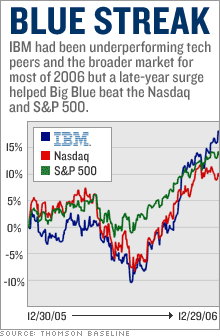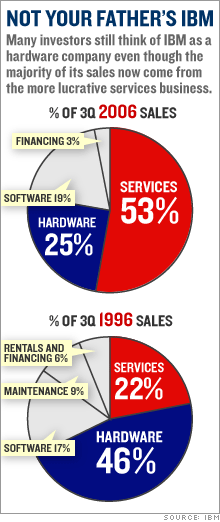No Big Blues for IBM's stockStock Spotlight: IBM is now the world's largest tech services company, but is it still a buy after last year's big run?NEW YORK (CNNMoney.com) -- IBM's been on a tear over the past six months, but it's not the IBM you once knew. This IBM builds your business network from the bottom up, supplies geeks for your tech support department and develops next-generation software. No ThinkPads here. Even before the company announced it would sell its struggling PC business to China's Lenovo in 2004, a notoriously unsexy part of the company had been driving revenue and, more importantly, profits: the global services division. Today, over half of IBM's sales and nearly 40 percent of operating profits come from the division that helps companies manage the technology they need to run their businesses. Yes, servers, chips and storage still account for a good hunk of revenue, but don't call IBM (Charts) a hardware company. What's more, the hardware it does make is more exciting. IBM has bulked up in the lucrative consumer electronics business lately. The company has chips inside every major gaming console: the Wii, Xbox 360 and PS3. IBM even showed up at this month's Consumer Electronics Show for the first time in a decade. And after topping earnings estimates for both the second and third quarters last year, IBM stock's been on a tear, up more than 35 percent since July. IBM will report fourth-quarter and full-year results on Jan. 18 and investors will be watching closely to see if IBM can beat estimates again. Analysts expect IBM to report sales of $25.6 billion, a 5 percent gain over the fourth quarter last year, and earnings of $2.18 a share, up 8 percent from a year earlier. But at the same time that the stock's nearing $100 - where it hasn't consistently traded above since late 2001 - some analysts are concerned that growth in the services division may be slowing. So is IBM stock a buy? Setback in services... With services dominating revenue, IBM's fortunes hang on how much big businesses and the government want to spend on technology in the coming year. Through its consulting division, IBM sends out employees to work with customers' tech strategists to design and upgrade existing networks. And through its outsourcing division, IBM caters to companies looking for the cheapest way to keep their networks running. CEO Samuel Palmisano, who rose to the top job from head of the global services division five years ago, deserves much of the credit for turning IBM into a services powerhouse, a trend begun by his predecessor, Lou Gerstner. But some investors are concerned about a near-term slowdown in demand. Revenue from services rose just 3 percent in the third quarter and Wall Street was disappointed by the number of new services contracts signed in the period. But IBM said in October that a number of major contracts had slipped from the third quarter into the fourth, raising investors' hopes that sales could be especially strong in that quarter. And according to market research firm IDC, corporate tech spending in the U.S. is expected to grow 6 percent in 2007, which bodes well for IBM. Longer term, analysts think the company has refined its mix of products, and is finally targeting the right (read: high-profit) markets. "They've really prepared a multi-front strategy to support corporations - software, hardware, consulting and outsourcing," said Dawn Talbot, an analyst with Soleil-One-On-One Research. On the consulting side, Talbot said, IBM has an advantage over dedicated tech consulting rivals like Accenture (Charts) and EDS (Charts) since it can offer its own software. Doug Christopher, an analyst with Crowell, Weedon & Co., agreed that having a strong services business helps IBM sell everything from servers and storage to new software. "Software and services are very complementary," he said. ...but software poised for growth IBM went on a software buying binge last year and analysts think this was a good move. Big Blue announced four software acquisitions in the fourth quarter and analysts said the companies were all strong complements for IBM's Tivoli systems management software and WebSphere e-business applications. "They've made some key acquisitions in the last year, and they're not overspending on them," said Christopher. "They're buying companies with established businesses that aren't too big, but that can grow." Ben Reitzes, an analyst with UBS, recently upgraded the company to "buy" based on the belief that solid software revenue will lead to much higher earnings in 2007. And he thinks software is going to be a much bigger revenue source, up from slightly less than 20 percent of sales now. Investors like the software business since it is far more profitable than other areas of the company. In the third quarter, IBM reported gross profit margins (which measure profits after subtracting the cost of sales) of 85 percent for software, compared to a gross margin of 28 percent for the services division. But can software drive the kind of growth the company needs to offset potential weakness in services? One analyst isn't so sure. "Software's just a smaller division, so it's going to have a lot less impact than the global services, which accounts for half of all sales," said Rich Williams, an analyst with ICAP. "If global services has a bad quarter, it's going to take amazing results elsewhere to offset it. It all really comes down to services now." A Big Blue buy? To be sure, IBM is so big that it's tough for it to post the kind of growth it used to. Analysts expect sales to rise just 4 percent for 2007, while profits will be up 10 percent. That would be a slowdown from the 13 percent earnings growth IBM is expected to report for 2006 - potentially not a good sign for investors considering the stock's recent rally. Williams added that investors need to see a pickup in services demand for the stock to keep climbing higher. "[IBM is] showing decent earnings growth, but a lot of that is cost-cutting that's been going on for a while, and people begin to wonder where the limits of that are," he said. "Investors want to see continued strong revenue growth in services." But IBM is trading at 15 times 2007 earnings estimates, a lower valuation than rivals in any of its major categories. Accenture and EDS each trade at 19 times 2007 earnings projections. Hardware competitors Hewlett-Packard (Charts) and Dell (Charts) trade at P/Es of 16 and 18. And software rivals Oracle (Charts) and SAP (Charts) are valued at 17 times and 25 times earnings estimates for this year. Of course, if the economy slows more than expected, IBM could be hit hard by a pullback in corporate tech spending. But so would every other software and hardware company catering to big businesses. IBM's focus on higher-margin markets like services and software, as well as a strong presence outside of the U.S., could soften the blow of any U.S. weakness. More than half of IBM's total sales come from outside the Americas. "Internationally, they're extremely strong - they're viewed as the gold standard," said Crowell, Weedon's Christopher. And with IBM trading at a discount to all of its top competitors, you could say the same about the stock. None of the analysts quoted in this story own shares of IBM. None of the firms have an investment banking relationship with the company. |
|



